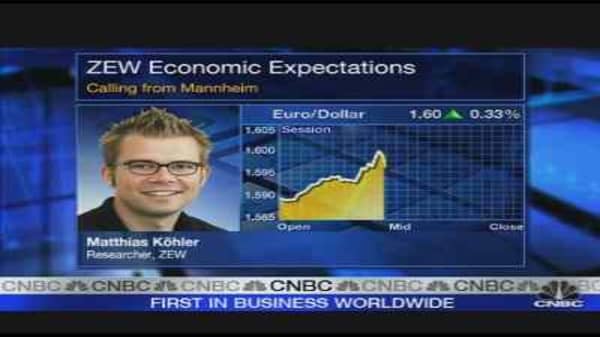A key gauge of German investor sentiment slid to a record low in July, battered by concerns about the U.S. financial sector and fears of a lasting downturn for German manufacturers.
The ZEW research institute's gauge of economic sentiment, which measures expectations for Germany, fell on Tuesday to -63.9 in July from -52.4 in June, well below the consensus prediction for a drop to -55.0.
The Mannheim-based think thank said the July reading, which was based on a poll of 308 analysts and investors, was the lowest since the survey began.
In a statement, the ZEW said high oil prices, the strong euro, the crisis in the United States, an interest rate increase by the European Central Bank and weak domestic consumer demand would probably hurt German companies over the next six months.
"Now, the prophets of doom are taking centre stage," said Carsten Brzeski, an economist at ING.
"The German economy is very likely to have shrunk in the second quarter and it cannot be expected to rebound any time soon. German industrial production has fallen for three consecutive months, new industrial orders even for six months and private consumptions is heavily dented by high oil prices."
A separate ZEW gauge of current conditions in Germany fell to 17.0 from 37.6 the previous month, below the consensus forecast for a decline to 32.7.
Germany's DAX index of leading shares has fallen more than 10 percent since June's ZEW survey was published as investors worried about the impact of the credit crisis on the financial sector and turmoil at U.S. mortgage financers.
European stocks slipped to their lowest level in three years earlier on Tuesday, with European banks including Deutsche Bank among the sharpest decliners.
Oil prices have risen more than seven-fold since 2002, driven higher by growing demand from emerging nations and rising cash inflows into commodities from investors seeking to hedge against inflation and the weak dollar.
Shares of U.S. mortgage finance firms Fannie Mae and Freddie Mac
were hammered last week on concerns that they may buckle under losses as the housing downturn drags on and their ability to raise capital has been severely hampered.
"The current problems of U.S. mortgage banks demonstrate that the financial crisis is not over yet," ZEW said.




